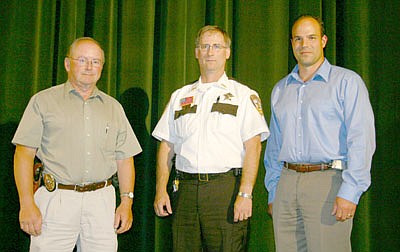July 6, 2006 at 7:07 a.m.
Internet is one place parents cannot let their children visit unsupervised
The sparsely attended meeting was both enlightening and frightening. Shoemaker, LAPD officer Tim Tougas and detective Craig Martin of the Hennepin County Sheriff’s Department shared stories and experiences with internet crime and fielded questions from the modest crowd.
Shoemaker started the informal presentation by explaining how he became interested in the topic. “I have two teenagers and they’re ‘plugged in.’ A while back, I walked in and my daughter was texting (text messaging), I-M ing (instant messaging) and on her cell phone at the same time,” the Chief Deputy said. “I had a computer background and got assigned to do internet crimes for the CCSD.”
Shoemaker went on to relate his experiences at a week-long internet crime in-service class. “About six years ago,” he shared, he learned how to make up a fake persona (a 14 year-old girl) and enter a chat room and how easy it is for kids to share more information than prudence would dictate.
“It’s all around us,” said Tougas, who worked for five years as the Police Liaison Officer at CLHS. “You can buy anything you want on the internet - alcohol, drugs of any kind, anything.”
Martin, a member of the ICAC (Internet Crimes Against Children) Task Force said, “We’re working with a lot of child porn. A lot of people collect child porn and then trade pictures, videoclips, etc.”
The discussion then went to “travelers” - guys who cultivate a relationship with young people over the internet and then travel to meet them. Shoemaker showed a videoclip about a teenage girl named Julie who made an internet “friend.” After many months of exchanging personal information, the traveler met Julie in her home town. Julie had been missing for three weeks when the two were caught on their way to Reno, Nevada.
Before she met him in person, Julie had no idea that her internet friend was a 57 year-old male who was a convicted murderer.
The traveler is currently serving a 25 year prison sentence. After his imprisonment, the traveler sent a letter to Julie telling her it was her fault he was in jail AND threatening to kill her upon his release.
Unfortunately, Julie’s story is not an isolated one. When asked if there were other similar situations, Martin said, “As many as you want. We have stacks and stacks of them.”
All three officers agreed that one of the most depressing things about information on the world wide web, is that, “Once it’s there, it’s there forever.”
There is some good news, according to Martin. “The internet allows us to take a proactive stance against guys who are victimizing these kids. A lot of times, they’re also victimizing their own kids, their grandkids or their neighbors’ kids.”
The three also agreed that the police have more latitude to investigate and prosecute crimes against kids than they would have in other situations. “I’ve never lost a case because of entrapment,” added Shoemaker.
When asked what parents can do to protect their children, all agreed that the most important thing is to educate kids about the dangers. Parents should be open with their kids about the dangers and make the youngsters feel it’s okay to tell them when they come across questionable material when accessing the internet.
According to the officers, when youth are asked why they didn’t tell their parents about objectionable, inappropriate or illegal information on the net, they usually say something like, “I was afraid I’d get banned from the internet or get grounded.”
Other steps parents can take include the following:
1) Keep the computer in a common area - NEVER let your child have access in their bedrooms.
2) Browse the internet history frequently - find out what sites they’ve been using.
3) Limit the times of the day that kids can be on the internet.
4) Install some kind of filtering software - filters can be set up to limit hours of use, limit access to age appropriate websites or record everything your child views or hears on the web.
5) Use internet safety websites like NetSmartz.org, SafeKids.com, SafetyEd.org and GetNetWise.org
6) Keep your eyes and ears open to find out when the next internet safety forum will be scheduled - look for a meeting in the fall. You’ll be glad you went!
Detective Martin made a statement that summarized the group’s feelings at the conclusion of the meeting. He said, “Parents are often way too naive about what their kids are doing and seeing on the internet.”




Comments:
Commenting has been disabled for this item.